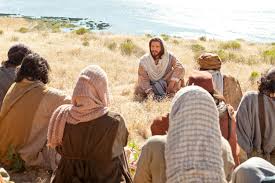
– 12 – 2 – 2023 –
Sixth Sunday Ordinary time -Year A
Gospel reading: Matthew 5:17-37
vs.17 Jesus said to his disciples:
“Do not imagine that I have come to abolish the Law or the Prophets. I have come not to abolish but to complete them.
vs.18 I tell you solemnly, till heaven and earth disappear, not one dot, not one little stroke, shall disappear from the Law until its purpose is achieved.
 vs.19 Therefore, the man who infringes even one of the least of these commandments, and teaches others to do the same, will be considered the least in the kingdom of heaven; but the man who keeps them and teaches them will be considered great in the kingdom of heaven.
vs.19 Therefore, the man who infringes even one of the least of these commandments, and teaches others to do the same, will be considered the least in the kingdom of heaven; but the man who keeps them and teaches them will be considered great in the kingdom of heaven.
vs.20 For I tell you, if your virtue goes no deeper than that of the scribes and Pharisees, you will never get into the kingdom of heaven.
vs.21 You have learnt how it was said to our ancestors: You must not kill; and if anyone does kill he must answer for it before the court.
vs.22 But I say this to you: anyone who is angry with his brother will answer for it before the court.
vs.27 You have learnt how it was said: You must not commit adultery.
vs.28 But I say this to you: if a man looks at a woman lustfully, he has already committed adultery with her in his heart.
vs.33 Again, you have learnt how it was said to our ancestors: You must not break your oath, but must fulfil your oaths to the Lord.
vs.34 But I say this to you: do not swear at all.
vs.37 All you need to say is ‘Yes’ if you mean yes, ‘No’ if you mean no; anything more than this comes from the evil one.”
**************************************
We have four sets of homily notes to choose from.
Please scroll down the page.
Michel DeVerteuil : A Trinidadian Priest, Specialist in Lectio Divina
Thomas O’Loughlin: Prof. of Historical Theology, Uni. of Nottingham.
John Littleton: Director of the Priory Institute Distant Learning, Tallaght
Donal Neary SJ: Editor of The Sacred Heart Messenger *******************************************************
Michel de Verteuil
Lectio Divina with the Sunday Gospels – Year A
www.columba.ie
General comments
(<<Church of the Sermon on the Mount)
This Sunday we have the third of the extracts from the Sermon on the Mount. I would advise that you stay with the full passage for this Sunday, even though a “shorter form” is allowed; we never know which section of a passage will touch us or the people with whom we are sharing.
The passage lends itself to moralising reading: “Jesus is telling us to…”. We must therefore make a special effort to start from our experience, as always in lectio divina. We ask ourselves the question: when did I experience Jesus telling me these things? The reading then becomes a celebration of moments of grace, teaching through experience. As always, you can remain with one section of the passage, or try to discover – with the heart, not the head – a thread running through the entire passage.
Like the whole Sermon on the Mount, this passage describes a conversion experience, “going deeper than the virtue of the scribes and Pharisees”. We need therefore to retrace our spiritual journey, from a “scribe and Pharisee” attitude to one that is “deep” – from a “single-issue” approach to one that is radical and holistic.
The rest of the passage celebrates the kinds of implications we become aware of when we experience radical conversion. Our spiritual journey will affect our commitment to Jesus and the church, but also our other commitments – to our families, neighbourhoods, social or political movements we may be involved in.
A recent statement by the late St Pope John Paul II is an example of the church’s conversion in its pro-life stance: “To choose life involves rejecting every form of violence, the violence of poverty and hunger, the violence of armed conflict, the violence of criminal trafficking in drugs and arms, the violence of mindless damage to the natural environment.”
By giving a broad interpretation to the text, we experience it as wisdom teaching, as Jesus intended it to be.
As always in Jesus’ teaching, the language is metaphorical, inviting us to enter it from experiences which we remember with emotion.
The sequence of thought may seem haphazard to our Western way of reasoning, but it has its own inner logic.
Textual comments
The passage can be divided as follows:
– Verse 20 is the centre piece of the passage; it explains the verses which precede and follow it.
– Verses 17 to 19 are an emotional celebration of “the Law” (here, the term can be taken to mean any noble cause we feel committed to) and of those who uphold it.
– Verses 21 to 26: a first series of implications, concerning those with whom we have quarrels.
– Verses 27 to 32: a second series of implications, concerning marriage relationships.
– Verses 33 to 37: a third series of implications, concerning the taking of oaths.
Scriptural Prayer
L ord, we thank you for those wonderful moments
ord, we thank you for those wonderful moments
when something we believed in half-heartedly and from the surface of ourselves suddenly touches us deeply.
We move from head to heart conviction, feel passionately committed, see the implications for every aspect of life.
Sometimes it is a teaching of Jesus:
– we must forgive seventy times seven times
– our neighbours and ourselves are linked in a common destiny
– the gentle will inherit the earth
– only those who mourn will be comforted.
At other times it is traditional wisdom:
– the importance of family and friendship
– love is more powerful than selfishness
– trusting our fellow believers and all believing peoples
– Supporting all peoples in need
– we can trust the future.
At other times we recognise the full implications
of a cause we had given ourselves to:
– democracy, feminism, ecology, climate change, human rights, non-violence.
It is a conversion experience, sudden, unexpected.
We are touched, as Jesus was when, in a burst of emotion,
he celebrated the greatness of the Law of Moses,
exclaiming that not one dot, not one little stroke,
would disappear from the Law until its purpose is achieved.
Like him, we feel tremendous gratitude for the great people
who kept the vision alive and taught it;
we feel sad that anyone could think of infringing one of the least of these commandments and teach others to do so.
How sad it is, Lord, to see a noble, idealistic enterprise
fall into the hands of scribes and Pharisees
who follow the letter of the law but go no deeper,
so that the enterprise loses its savour,
is no longer a city built on a hilltop, ushering in your kingdom.
 The sign of this happening is that people start being content with the minimum,
The sign of this happening is that people start being content with the minimum,
playing it safe, avoiding evil rather than doing good,
concerned mainly with being respectable and making a good impression, playing it safe.
In Jesus’ day is was not killing, not committing adultery, not breaking oaths; but Moses’ law, like all authentic renewal movements, intended to do away with
– anger and contempt in any form whatsoever,
calling one another fool or renegade,
– looking at other lustfully, seeing them as objects of conquest
who will satisfy our ambition, or compensate for our insecurities,
– acting because we feel bound by an external force,
in heaven, on earth, in some holy city, even in ourselves,
rather than from our inner conviction, our own yes or no.
We remember when our virtue too went no deeper than that of the scribes and Pharisees.
We thank you that we experienced a conversion, and our priorities are now quite different from what they were.
We realise how much we used to be concerned with external rituals.
 Now, if brothers or sisters have something against us, we leave our offering on the altar, go and be reconciled with our brothers and sisters first, and then come back and present our offering.
Now, if brothers or sisters have something against us, we leave our offering on the altar, go and be reconciled with our brothers and sisters first, and then come back and present our offering.
We feel a new urgency about living according to our beliefs,
it becomes a matter of life or death.
We are like litigants who come to terms with their opponents in good time when they are still on the way to the court, for fear that they will be handed over to the judge and be thrown into prison until they have paid the last penny.
We thank you that we feel fulfilled and have no problems giving up things we had thought we could not do without:
– being popular or surrounded by a group of friends,
– making a lot of money,
– having our name in the newspapers for good reasons.
We had thought it would be painful to give up these goals,
almost like tearing out our right eye or cutting off our right hand.
We thank you for the grace of seeing that they were causing us to betray our integrity,
that we are better off without them than having them and living empty lives, like people having their bodies intact and being thrown into hell.
Lord, we thank you for that person you sent into our lives,
that Jesus who brought us to conversion.
We pray that we in our turn may bring his message of conversion
to those we live and work with – our church communities,
the great renewal movements of our time, our families, neighbourhoods and schools.
**************************************************
Thomas O’Loughlin
Liturgical Resources for the Year of Matthew
www.columba.ie
Introduction to the Celebration
The word ‘religion’ conjures up for most people, and indeed us Christians also, two great images.
The First is that system of moral ‘do’s and don’ts‘ — whether one thinks such rules are a good thing or not.
The Second is that there are various religious practises that have to be followed: like the rule that we have to go to church on Sundays. But the message of Jesus, brought out in the gospel, is that we must go beyond these appearances:
our actions must be following but must be inspired love;
our religious observances cannot be merely formal must open us to mystery of love that is greater and enters every detail of the creation.
Homily notes
1. We tend to think of the contents of today’s gospel as a series of little pieces: a rule on this, a rule on that, a bit of theology on some other point. Apart from the fact that this ‘chop-up into sentences’ approach to the gospels is not good exegesis but a variant type of fundamentalism, this approach misses the whole point of the sermon by Jesus.
The central point is that the message of the gospel is greater than the sum of its parts. It is not a new rule about this, a change in the rules about something else, and so forth; rather, the message is that God’s love is greater than all, and we are called to respond that love in a complete loving way, not simply by a formalistic fulfilment of regulations. Love always must go beyond ‘box ticking’ or it is not love.
2. This has an effect on how we preach: if we turn the gospel into a series of new regulations, and preach them as such, our preaching is reversing the very point of today’s gospel. This is also the fundamental reason why the shorter form of today’s gospel supplied in the lectionary is so inappropriate. So how can we reflect on the message that love and faith are more than ‘box ticking’?
3. The first point is to state just that: love and faith are more than ‘box ticking.’ We can keep all the rules, but if our lives have not got that spark of love and laughter, then we are not following the God of love but the’ great policeman in the sky’.
4. That sparkle of love is what makes the difference between the saint and the intense rule-keeping boor. That sparkle is the ability to see beyond the rules, to glimpse a mystery that is greater than the universe, to glimpse the love of God beckoning us.
5. But while attention to detail and discipline can train us in keeping the rules, we can only discover how to love through forgiving those who have hurt us irrespective of whether they ask for forgiveness or not, or are repentant or not. We can only discover how to love by helping those in need, whether they ‘deserve’ help or not. We can only discover how to love by standing with those who are oppressed ever if it is dangerous for us.  We can only discover how to love by asking the Holy Spirit to enlighten our minds with wisdom.
We can only discover how to love by asking the Holy Spirit to enlighten our minds with wisdom.
6. Love is the sparkle of the good news, the joy of being a disciple, but it is never the easy option.
***********************************
John Litteton
Journeying through the Year of Matthew
www.Columba.ie
Gospel Reflection
 People frequently refer to the Sermon on the Mount as being the New Law, replacing the Old Law, and the impression given is that, with Jesus, the rules have been somewhat loosened. Now it can be said that it is love that counts and that the rules take second place. But the error of this opinion is quickly evident when we check the eight Beatitudes at the beginning of the Sermon. Far from making life easier, the Sermon is even more demanding than the Old Law.
People frequently refer to the Sermon on the Mount as being the New Law, replacing the Old Law, and the impression given is that, with Jesus, the rules have been somewhat loosened. Now it can be said that it is love that counts and that the rules take second place. But the error of this opinion is quickly evident when we check the eight Beatitudes at the beginning of the Sermon. Far from making life easier, the Sermon is even more demanding than the Old Law.
As God gradually revealed himself to the Chosen People, they began to understand that he loved them and wanted them to enjoy life in the land that he had given to them. In order for this to happen, they were to heed the warnings of the prophets and be faithful to God’s commandments.
Therefore, they must not kill. They must not steal. They must be faithful to their spouses and they must not envy their neighbour. Contrary to what some people suggest nowadays, the Chosen People understood that God wanted them to keep his laws because he loved them, and not because he wanted to make them wretched and unhappy.
We know this from God’s revelation of his loving nature in biblical texts such as the beautiful story of Hosea, whose love for his prostitute wife was analogous to the love that God had for his headstrong and sinful people. Through the prophets, God continually reminded them of his love, even as he pulled them back from the brink of destruction on many occasions. Indeed, in chapter 5 of the Book of Deuteronomy, we read that it was from God’s love that the Ten Commandments sprang. Before listing the commands, God reminded them: ‘I am YHWH your God who brought you out of the land of Egypt, out of the house of slavery’ (Deut 5:6).
During the Sermon on the Mount itself, Jesus told his listeners that he had not come to destroy the Law or the Prophets: ‘Do not imagine that I have come to abolish the Law or the Prophets.
 I have come not to abolish but to complete them. I tell you solemnly, till heaven and earth disappear, not one dot, not one little stroke, shall disappear from the Law until its purpose is achieved’ (Mt 5:17-18).
I have come not to abolish but to complete them. I tell you solemnly, till heaven and earth disappear, not one dot, not one little stroke, shall disappear from the Law until its purpose is achieved’ (Mt 5:17-18).
To understand the implication of this key statement of Jesus, we might reflect that he sought not the end of the Law, not its destruction, but its perfection. Hence in the Sermon, Jesus taught that it is no longer sufficient not to kill one’s neighbour. In future, his disciples would be required to control their anger so that their thoughts were purified and perfected. One by one, this extension of the Ten Commandments to thoughts and motives as well as actions, is found throughout this unique Sermon.
Jesus reinforced the idea of Christian perfection by linking it to the worship of God. If his followers desired to approach the altar and, while there, remembered friction with another person or people, they would be expected to leave their gifts at the altar and go to be reconciled first. The lesson for us is clear. This is how seriously God views our human relationships. We cannot hate our neighbour and purport to love God. That is not possible.
A much overlooked exhortation in the Sermon concerns prevarication in speech: ‘All you need say is “Yes” if you mean yes, “No” if you mean no; anything more than this comes from the evil one’ (Mt 5:37).
The Sermon on the Mount, then, especially each of the Beatitudes, provides us with a rich mine of spiritual treasures that give us much food for meditation.
For meditation
For I tell you, if your virtue goes no deeper than that of the scribes and Pharisees, you will never get into the kingdom of heaven. (Mt 5:20)
***************************************
Donal Neary SJ:
Gospel Reflections for Sundays of Year A: Matthew
www.messenger.ie
The heart of religion
This list of some of Jesus’ sayings give an indication of what is important to him. He states the religious tradition of the people when he says that he has not come to abolish the old religion, and that religion must go much deeper and be an affair of the heart. He asks for forgiveness and reconciliation when he speaks about leaving a gift at the altar to go for reconciliation. He commends marriage, and faithfulness in marriage, in his views on divorce. He believes in the respect for sexuality that is shown in not using a person. This collection of Jesus’ sayings form a background to how he lived his life himself. He lived out these sayings in many of the events of his life, which we hear about on other Sundays. The Sermon on the Mount, of which this is part, is the backdrop to much of Jesus’ life and mission, a sort of vision statement for his life and ministry.
Much of this went against the religious practice of his people, which was centred mostly on externals. He saw the ritual and the law of religion as important only if it came from the heart. This is the challenge always to religion – to live heartily what it enthusiastically believes. Practices in ritual and in religious custom and laws may change with different cultures and times; what is important is the way we live our lives, following Jesus and knowing that all our efforts to live like him are praised and rewarded. Pope Francis says, ‘It is not enough to just respect the commandments and do nothing more. Christian life is not just an ethical life: it is an encounter with Jesus Christ’ (9 May 2016).
This is the challenge always to religion – to live heartily what it enthusiastically believes. Practices in ritual and in religious custom and laws may change with different cultures and times; what is important is the way we live our lives, following Jesus and knowing that all our efforts to live like him are praised and rewarded. Pope Francis says, ‘It is not enough to just respect the commandments and do nothing more. Christian life is not just an ethical life: it is an encounter with Jesus Christ’ (9 May 2016).
Repeat a favourite gospel phrase as you breathe in;
your outbreath is your thanks for this help in your life.
Lord, your will be done each day in my life.
******************************************************